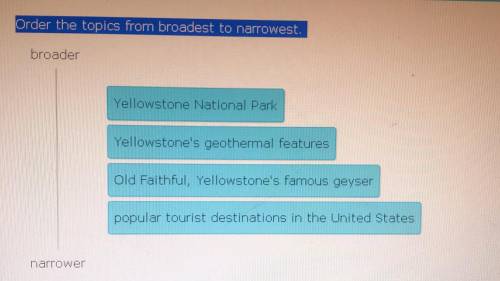Order the topics from broadest to narrowest
...

Answers: 1


Another question on English

English, 21.06.2019 14:00
Which questions must be considered when evaluating the effectiveness of an argument? select four options. is there empirical evidence in the argument? is there reliable evidence to support the reasons? are there logical reasons to believe the claim? is the author’s claim clear to the reader? does the author’s diction affect the reader as intended?
Answers: 2

English, 21.06.2019 21:30
Read the excerpt from julius caesar, act 1, scene 1. marullus. wherefore rejoice? what conquest brings he home? what tributaries follow him to rome to grace in captive bonds his chariot wheels? you blocks, you stones, you worse than senseless35 things! o, you hard hearts, you cruel men of rome, knew you not pompey? many a time and oft have you climbed up to walls and battlements, to towers and windows, yea, to chimney-tops, your infants in your arms, and there have sat40 the livelong day, with patient expectation, to see great pompey pass the streets of rome. which summary of the passage is the best? marullus asks a lot of questions, such as, “why celebrate? what has caesar done? who is following him to rome? don’t you remember pompey? ” then he says that everyone is cruel because they do not remember pompey. they forget how they praised him and would climb to the highest places, carrying their children, just to catch a glimpse of him. marullus regrets that the people are celebrating caesar and is insulted that they forgot how they used to praise pompey. marullus thinks that the people should celebrate caesar the way they used to celebrate pompey, and that they should be in awe of caesar’s greatness. marullus remembers how the people climbed walls, battlements, towers, windows, and even chimney tops to see the great pompey.
Answers: 1

English, 21.06.2019 22:30
1) earth's crust is made up of relatively rigid plates that ride atop earth's hot, semiliquid mantle. (2) the plates are called tectonic because they're in constant motion. (3) they can move because earth's mantle is a very hot and semiliquid fluid called magma. (4) volcanoes are a result of magma rising up or erupting through a plate, particularly where plate boundaries are moving against each other. (5) also, when plates slide against each other, causing friction along adjacent plate boundaries, earthquakes frequently occur. (6) therefore, we often find volcanoes and earthquakes along plate boundaries. (7) plates may also collide. (8) when that happens, mountain ranges are formed. (9) for example, the collision of the plate carrying the indian subcontinent created the himalayan mountains when it collided with the asian plate. which statement about this paragraph is accurate?
Answers: 3

English, 22.06.2019 00:30
Excerpted from "the children's hour" by henry wadsworth longfellow a whisper, and then a silence: yet i know by their merry eyes they are plotting and planning together to take me by surprise. a sudden rush from the stairway, a sudden raid from the hall! by three doors left unguarded they enter my castle wall! look carefully at the lines above. a poem with this particular rhyme scheme is best read a. line by line. b. with long pauses. c. phrase by phrase. d. with a strong rhythm.
Answers: 2
You know the right answer?
Questions

Mathematics, 18.03.2021 01:20


Biology, 18.03.2021 01:20


Advanced Placement (AP), 18.03.2021 01:20

Social Studies, 18.03.2021 01:20


Mathematics, 18.03.2021 01:20

Mathematics, 18.03.2021 01:20







Mathematics, 18.03.2021 01:20

English, 18.03.2021 01:20

Social Studies, 18.03.2021 01:20

Mathematics, 18.03.2021 01:20

Mathematics, 18.03.2021 01:20




